How can the media better represent disabled people?
That was the big question at our Annual Conference this year. Broadcasters, media outlets, disabled media professionals and Welsh Government Ministers joined us at Glamorgan County Cricket Club as this year’s theme, Challenging Stereotypes, Changing Society: Disabled People and the Media, provoked lively discussions and debate.
Delivered as a hybrid event, some members, friends and allies joined us in-person whilst others logged in online to watch live on YouTube.
Sponsored by S4C, the conference explored the representation of disabled people across print, digital and broadcast media, drawing on positive and negative examples and prompting important conversations between the people featured in the stories and those responsible for sharing them.
Over the years, news stories and media features about disabled people have seldom been a true reflection of the lives we lead and the societal barriers we face. More often than not, stories adhere to stereotypes with features perpetuating disabled people as benefit scroungers or, in contrast, presented as superheroes who have accomplished great feats.
On the other hand, we know that the media can be a great tool to challenge these stereotypes and can serve as a powerful force in terms of changing society’s view of disability, promoting our rights and raising awareness of the barriers that disable us.
Honest conversations about representation in the media were at the heart of the agenda which we were guided through in the safe hands of our conference Chair, Emma Meese, Director of Community Journalism at Cardiff University.
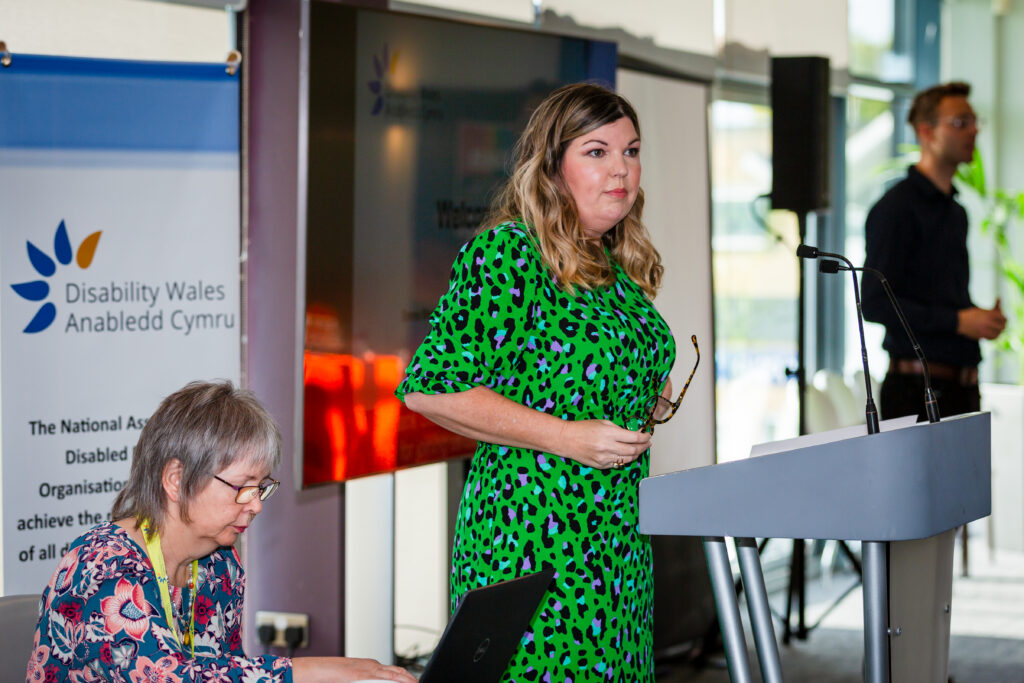
‘This is where conversation not only starts but where action happens,’ said Emma as she welcomed the 100+ people in the room and the hundreds who also tuned in online, making this Disability Wales’s largest conference in a very long time.
Keynote speeches: The activists
Our Chief Executive set the tone for the day’s discussions, asserting the fact that historically, media, whether it be literature, film or news has portrayed and perceived disabled people as either ‘tragic and helpless or tragic and brave’.
Rhian went on to explain that the ever-growing catalogue of stereotypes that the media often draws from ‘turns people into objects of pity or derision or as inspirational porn for wider society, robbing people individually and collectively of any agency or control over their lives and also, and most fundamentally, overlook the barriers placed in their way in the education system, workplace or community.’

She also told the audience that the media had been ‘complicit’ in accepting the UK government’s narrative that the deaths of disabled people during the Covid-19 pandemic were ‘inevitable, unavoidable, expendable’ and questioned why there was ‘no sense of national scandal’ and ‘zero coverage’ in the media of the high death rate of disabled people during this time.
‘However, the growth of the Disabled People’s Movement and campaign for civil rights legislation in the eighties and nineties presented a real challenge to society and especially the media,’ added Rhian before nodding to how the campaigning role of Disabled People’s Organisations across the UK has contributed to shifting perceptions.
But despite the rise in representation of disability issues on mainstream programmes, there still exists ‘the deserving and undeserving face of disability’. This is why, Rhian said, we need more disabled people working behind the scenes to challenge the ‘accepted narrative.’
‘We need to see news and programming that reflects us as disabled people, the reality of our lives as well as our hopes and aspirations.’
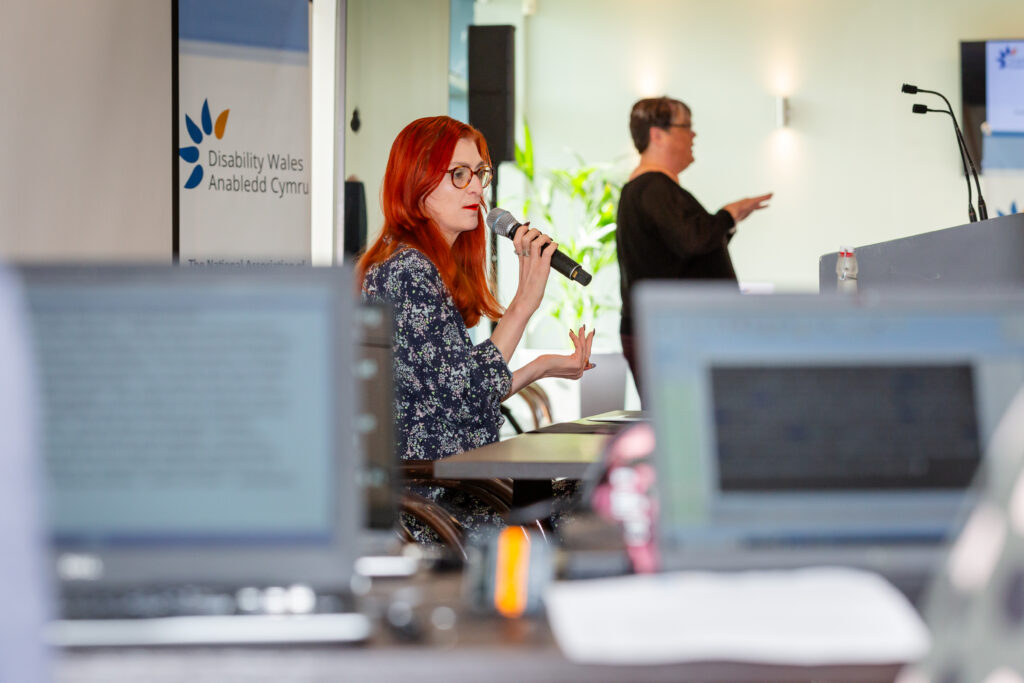
Notes from Rhian’s speech were echoed in that of award-winning disabled journalist and activist Rachel Charlton-Dailey who spoke extensively about the portrayal of disabled people as ‘fakers’ or ‘benefit scroungers’ and how damaging this rhetoric can be.
Rachel claimed that ‘journalists are too afraid to use the word disabled’ and instead substitute it with terms that reinforce ableism.
A stereotype fuelled narrative which is embellished by the misuse of language is the reason Rachel called on the Independent Press Standards Organisation (IPSO), which regulates most of the UK’s newspapers and magazines, to introduce much-needed guidelines on reporting disability issues.
But despite presenting over 300 complaints about stories centring disabled people to the regulator, Rachel was told that the editor’s code only applied when a media organisation discriminates against an individual, not when it attacks a group such as disabled people.
Rachel told the conference: ‘Working in an industry that actively endangers the lives of my community is exhausting.’
Their frustration with the way disabled people are portrayed in print media and the inaccessibility of the industry spurred Rachel onto creating their own publication called The Unwritten, a platform where disabled writers can ‘get their unfiltered views out in to the world.’
The rise of The Unwritten culminated in the Daily Mirror series Disabled Britain: Doing it for Ourselves, edited by Rachel. Having a series of disabled people’s stories which were void of ableist language and focused on societal barriers rather than a person’s impairment or health condition in a major tabloid was a breath of fresh air and at the end of their speech, Rachel reiterated the importance of this, saying: ‘Disabled people deserve to live full, complex, messy, happy, even sad lives and we deserve a media that represents that.’
Watch Rachel’s speech in full.
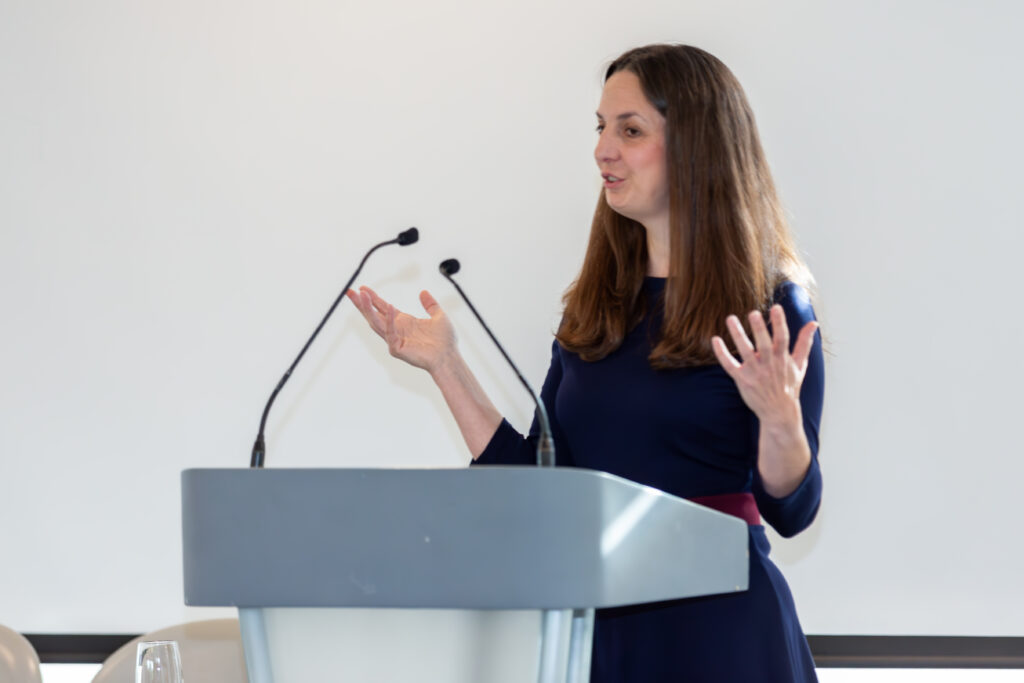
Sticking with the theme of print media, photo-journalist and President of the National Union of Journalists (NUJ), Natasha Hirst, was next to address the audience.
Being a previous Disability Wales Board and staff member, we have worked closely with Natasha over the years and we were delighted to hear her saying that DW has played ‘a really important part’ in her journey as a disability activist.
Natasha said that, unlike TV broadcasting, publications such as newspapers and magazines are not required to collect and share statistics on diversity and equality and expressed how this lack of information makes it difficult for activists to prove that ‘journalism isn’t an equal and inclusive place for disabled people.’
When it comes to the stories that are written about disabled people, she said that ’many editors and managers don’t understand the importance of the Social Model,’ which means that articles are shaped by stereotypes.
That’s why, Natasha said, ‘Disabled people need to have more control over the stories that are told about us.’
In the same breath, she signalled the severe lack of disabled journalists in senior leadership roles and how difficult it can be for disabled journalists to break into the industry.
She said: ‘Disabled journalists experience many barriers in their careers, and although there are schemes to get disabled people into journalism, there’s very little support for them to progress their careers in getting to those senior roles where they are able to influence change.
‘There are not enough disabled role models, workplaces are not accessible enough, and many disabled journalists tell the union that they experience terrible discrimination at work.’
She emphasised the influence journalism and the media can have on society, saying: ’When we do our jobs well, journalists can help change society for the better but when we fail, we reinforce inequality and discrimination.’
Natasha ended her talk by saying: Together, let’s drive ableism out and transform the media here in Wales and lead the way for everybody else to follow.’
Watch Natasha’s speech in full.
Keynote speeches: The Policy Makers
Following talks from Rachel and Natasha, we were delighted to welcome not one but two Welsh Government Ministers, Jane Hutt MS, Minister for Social Justice and Chief Whip and Dawn Bowden MS, Deputy Minister for Arts, Sport and Tourism.
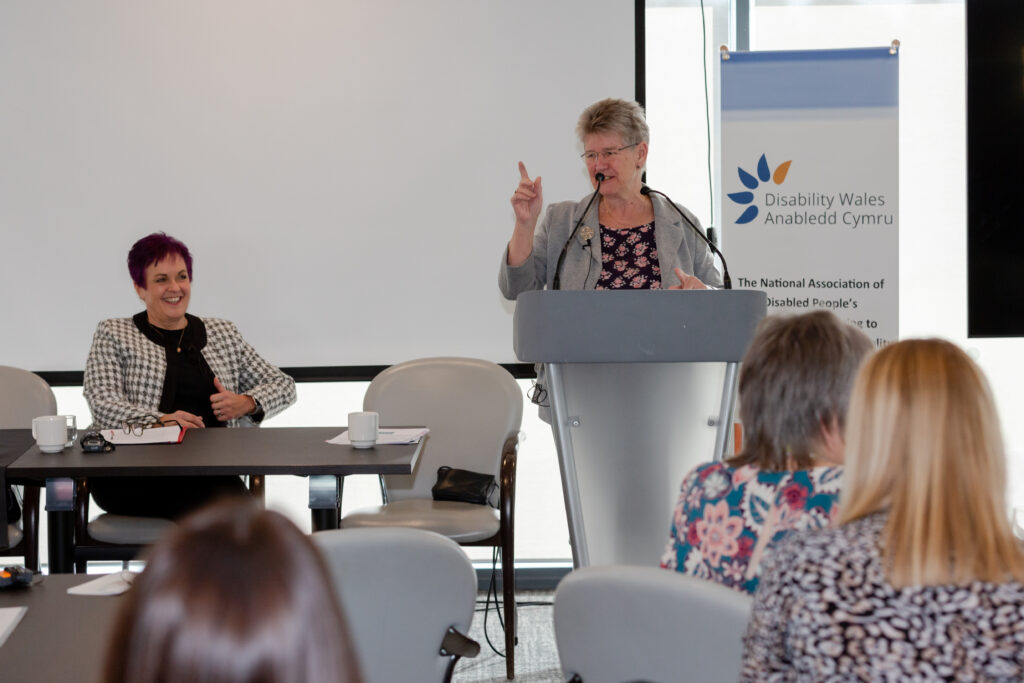
Jane Hutt MS spoke about the work of the Disability Rights Taskforce which ‘is identifying the root causes of discrimination and resulting inequalities and short, medium and long-term actions needed to address them.’
She explained that the work of the Taskforce is ‘looking at putting in place interventions to help shape how the media representation of disabled people evolves from one dominated by stereotypes to one where each disabled person is seen to be the individual they are.’
‘Today, I’m not only reiterating that this government recognises the discrimination and inequalities faced daily by disabled people but we are resolute to address them and to take significant action to do so.’
She thanked the audience for their engagement with the work of the taskforce and for the evidence people have shared as part of its working groups.
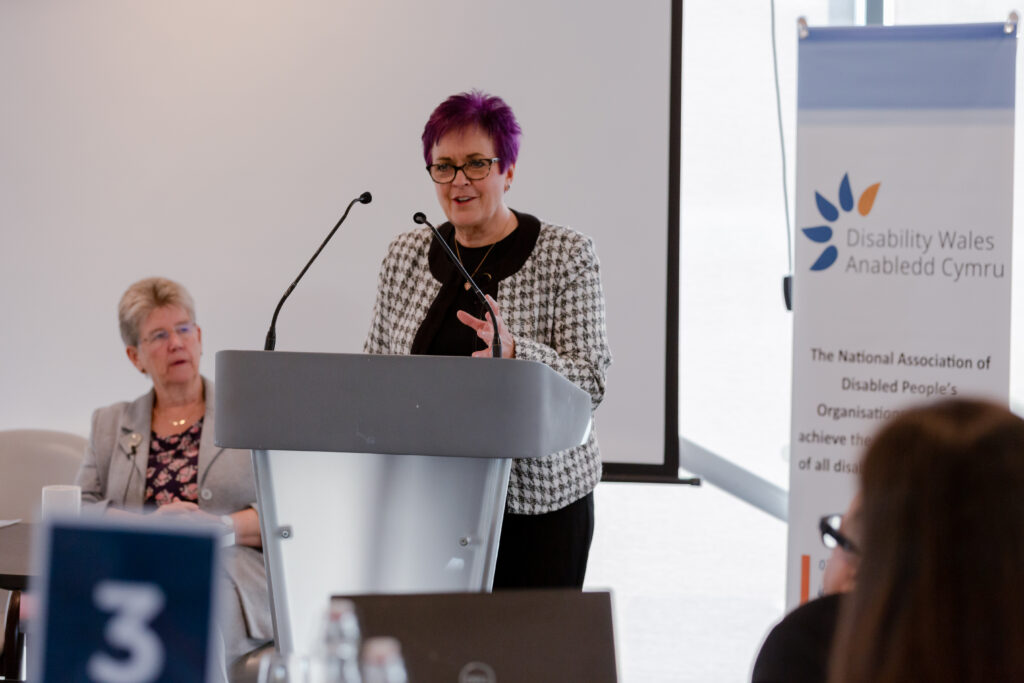
Dawn Bowden MS’ opening remark was that ‘far too often, the portrayal of disabled people across the media could be, at best, described as lazy and, at worst, pure ableism.’
She rejected the claim that the media is no more responsible for perpetuating stereotypes than any other sector and asserted the fact that ‘the media has such a big role to play in shaping the values, perceptions and the attitudes towards disabled people.’
She continued by saying: ’It’s crucial for media professionals to approach disability representation with care, accuracy and respect in order to contribute to the building of a more inclusive and equitable society.’
Through the work of Creative Wales and other initiatives, the deputy minister explained that the Welsh Government hopes ‘to go some way in facilitating a media sector that is more inclusive and far more reflective of disabled people’s lives.’
Watch the Ministers speeches in full.
Media panel
It was time to hear to what extent that is currently happening in our panel of media representatives from BBC Cymru Wales, ITV Cymru Wales, S4C and WalesOnline, chaired by Rachel Charlton-Dailey.
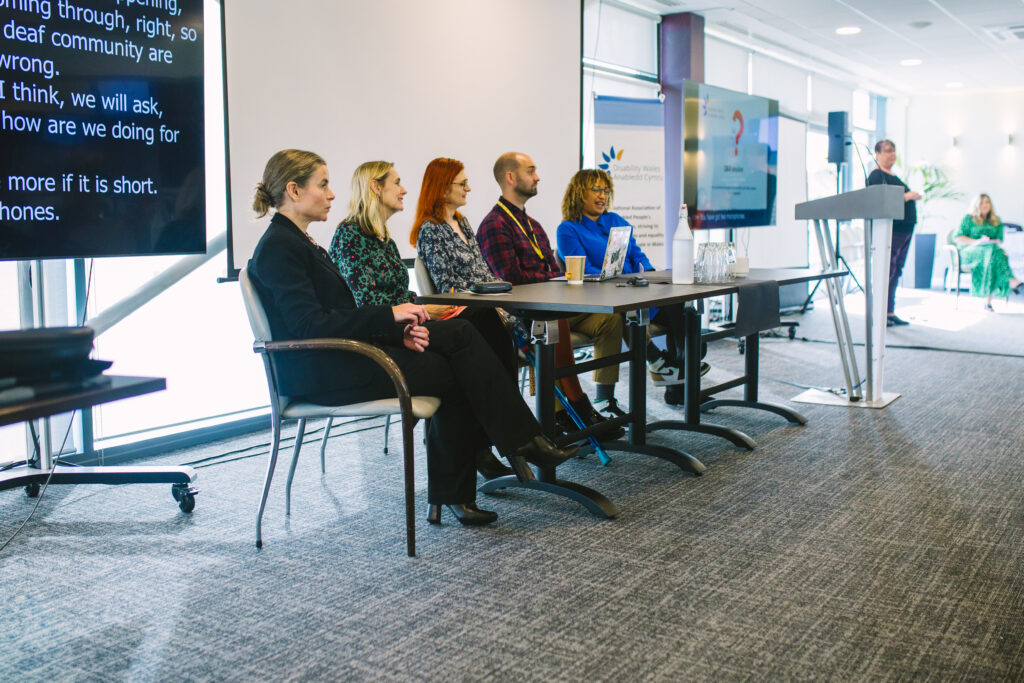
Each representative started off with a short presentation of their work when it comes to diversity, equality and the representation of disabled people on-screen, in headlines and behind the scenes.
Emma Jenkins, Diversity and Inclusion Champion at ITV Wales, kickstarted the panel, firstly focusing on ITV Cymru Wales workforce and how statistics show that 21.6% of its staff are Deaf, disabled or neurodivergent, before sharing information about the different initiatives ITV Wales have actioned to increase the representation of disabled people on and off-screen.
Next up, Sian Gwynedd, Head of Culture and Partnerships at BBC Cymru Wales, spoke about the ‘Talk Disability’ initiative which was launched after a stark realisation that BBC Cymru Wales wasn’t doing enough in terms of disability representation, ‘both in terms of content and workforce.’
Ryan Chappell, Diversity, Sustainability and Social Purpose Leader at S4C, explicitly stated how far behind the organisation is in terms of disability representation, particularly in terms of its workforce. He sees language as a particular barrier for S4C and expressed a keen interest in hearing from Welsh speaking disabled people who are interested in working in the TV industry to establish those connections and promote the number of disabled people working for the channel.
Last but not least was Catrin Pascoe, editor of the Western Mail, who spoke about the importance of disability equality training to help boost journalist’s confidence in reporting on disability issues. She also flagged the fact that sometimes they do get it wrong when it comes to sharing disabled people’s stories but that they are committed and open to recognising this and to learn from the good as well as the bad.
Following the short presentations, a roving microphone toured the room as members of the audience were given the opportunity to ask questions.
Questions to the panel ranged from how content and the workforce itself can be made more inclusive and there was particular challenge to the lack of coverage of the high death rate of disabled people during the pandemic.
When asked if any of the broadcasters and news outlets were covering the events of our annual conference on their platforms, the room was shocked to hear each panelists saying ‘no’ and our Chief Executive, Rhian Davies, expressed her disappointment, saying that the media often use disabled people’s stories and we don’t get anything back.
Her final plea to the panel was: ‘Please do better.’
Watch the panel and Q&A in full.
Members Media Showcase
After lunch, the agenda was dominated by a media showcase which saw disabled members and activists involved in the media discussing their experiences of working on local and national TV shows and representation of their stories in the media.
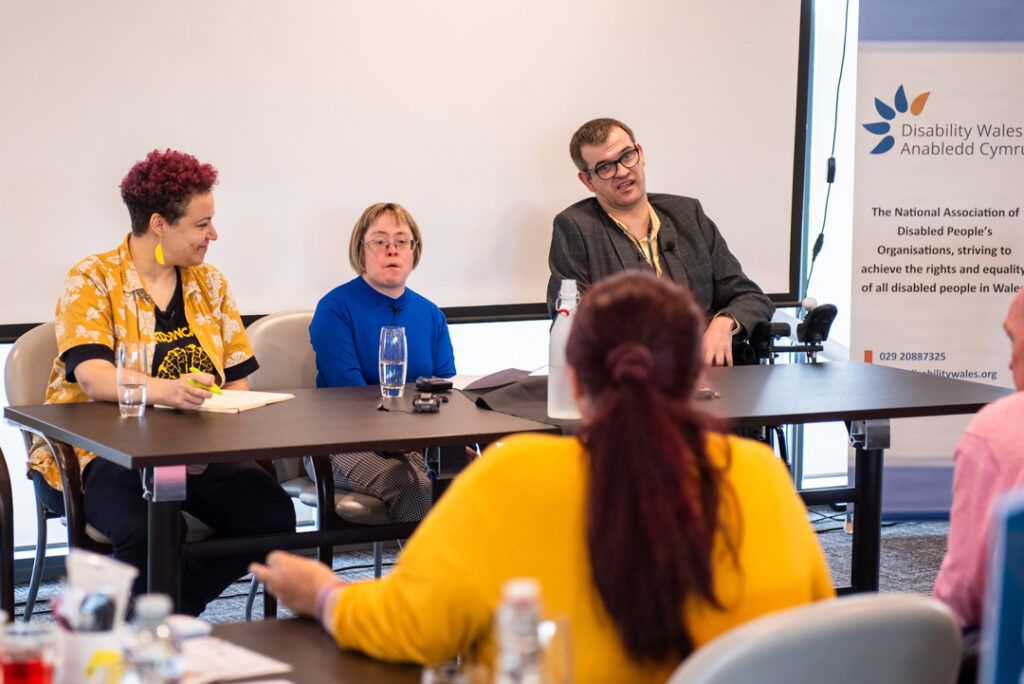
First up, Lee Ellery spoke about his show, Spotlight on Disability, on SwanTV and how important he feels it is to highlight authentic and positive stories from disabled people.
Next, Sara Pickard spoke highly of her time working at ITV Cymru Wales whilst on secondment from Mencap Cymru. The audience were treated to a rundown of the work Sara was involved with and how inclusive she felt the experience to be. Clips of her work on programmes such as Sharp End were also shared to amplify her message.
Selena Caemawr, founder and director of Aubergine Cafe, closed the showcase with a powerful talk about how difficult it can be to start a dialogue with the media, even when you have established contacts. They explained that an inaccessible industry is the reason why neurodivergent people often opt for self-employment.
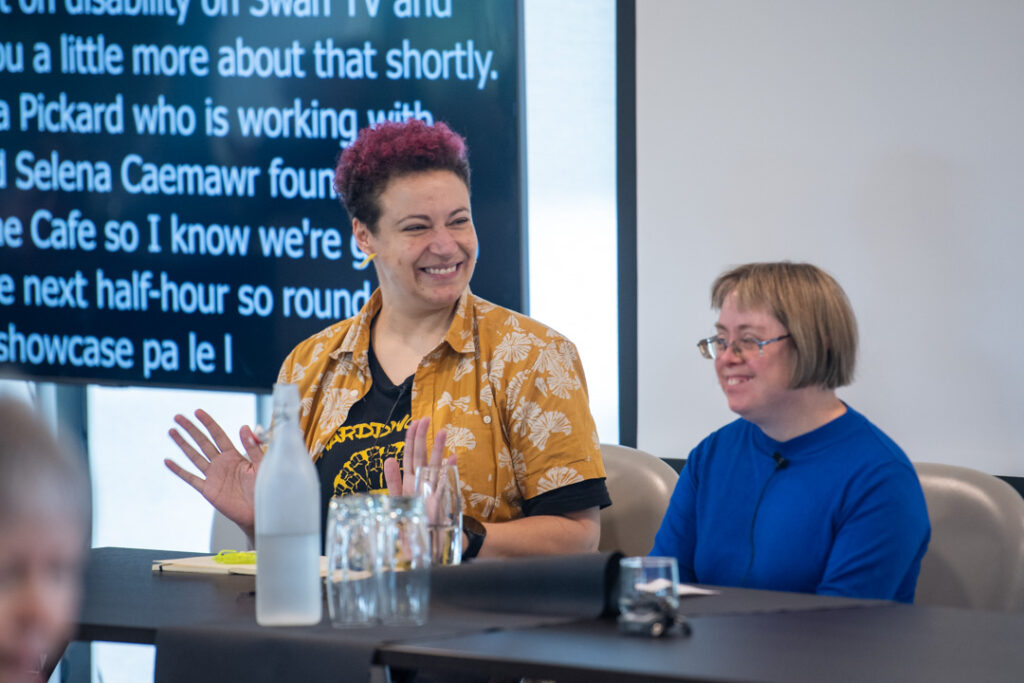
We can’t thank the three speakers enough for being so candid in their presentations. The audience were captivated throughout the showcase and it was refreshing to focus on positive actions that are happening within the media too.
Conference chair, Emma Meese, took to the podium to close the day’s events. Summing up the day’s key messages, she said that it is clear that more needs to be done on representation and tackling misrepresentation, challenging the media narrative and agenda setting on issues ‘they don’t understand.’
Following a rundown of some of the statistics shared throughout the day, Emma added: ’It’s really important to focus on people not statistics,’ to make sure that equality is actioned and achieved.
‘There’s so much enthusiasm and talent in this room, it can’t end here.’
Thank you
We’d like to extend a heartfelt thank you to everyone who joined us on the day, whether it be in-person or online.
A massive thank you also goes to all those who worked hard behind the scenes to make our annual conference a success. From those who made the livestream a reality to the communication support who worked tirelessly to make sure the event was accessible to as many people as possible.
Thank you to all our speakers who shared their thoughts, expertise and experiences so openly, provoking lively discussions which we can only hope results in positive action and more representative and authentic headlines, features and shows.
If you were not able to join us on the day, links to videos of each session have been peppered throughout this post but incase you missed them, here’s a link to the full YouTube playlist.
Until next year!



